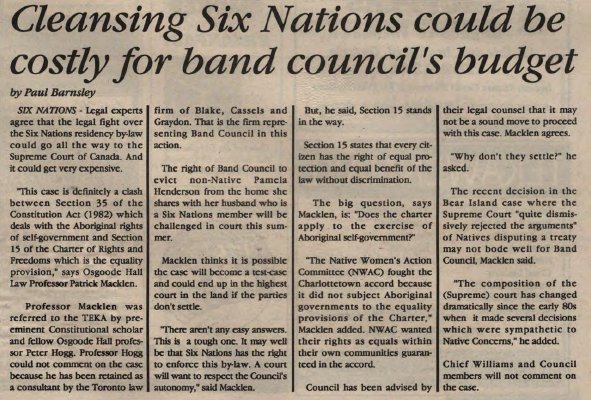"Cleansing Six Nations could be costly for band council's budget"
- Publication
- Tekawennake News (Ohsweken, Ontario), 13 Apr 1994
- Full Text
- Cleansing Six Nations could be costly for band council's budgetby Paul Barnsley
SIX NATIONS - Legal experts agree that the legal fight over the Six Nations residency by-law could go all the way to the Supreme Court of Canada. And it could get very expensive.
"This case is definitely a clash between Section 35 of the Constitution Act (1982) which deals with the Aboriginal rights of self-government and Section 15 of the Charter of Rights and Freedoms which is the equality provision," says Osgoode Hall law Professor Patrick Macklen.
Professor Macklen was referred to the TEKA by preeminent Constitutional scholar and fellow Osgoode Hall professor Peter Hogg. Professor Hogg could not comment on the case because he has been retained as a consultant by the Toronto law firm of Blake, Cassels and Graydon. That is the firm representing Band Council in this action.
The right of Band Council to evict non-Native Pamela Henderson from the home she shares with her husband who is a Six Nations member will be challenged in court this summer.
Macklen thinks it is possible the case will become a test-case and could end up in the highest court in the land if the parties don't settle.
"There aren't any easy answers. This is a tough one. It may well be that Six Nations has the right to enforce this by-law. A court will want to respect the Council's autonomy," said Macklen.
But, he said, Section 15 stands in the way. Section 15 states that every citizen has the right of equal protection and equal benefit of the law without discrimination.
The big question, says Macklen, is: "Does the charter apply to the exercise of Aboriginal self-government?"
"The Native Women's Action Committee (NWAC) fought the Charlottetown accord because it did not subject Aboriginal governments to the equality provisions of the Charter," Macklen added. NWAC wanted their rights as equals within their own communities guaranteed in the accord.
Council has been advised by their legal counsel that it may not be a sound move to proceed with this case. Macklen agrees.
"Why don't they settle?" he asked.
The recent decision in the Bear Island case where the Supreme Court "quite dismissively rejected the arguments" of Natives disputing a treaty may not bode well for Band Council, Macklen said.
"The composition of the (Supreme) court has changed dramatically since the early 80s when it made several decisions which were sympathetic to Native Concerns," he added.
Chief Williams and Council members will not comment on the case.
- Creator
- Barnsley, Paul, Author
- Media Type
- Text
- Newspaper
- Item Type
- Clippings
- Publisher
- Tekawennake News
- Place of Publication
- Six Nations of the Grand River, ON
- Date of Publication
- 13 Apr 1994
- Subject(s)
- Personal Name(s)
- Macklen, Patrick ; Hogg, Peter ; Henderson, Pamela.
- Corporate Name(s)
- Six Nations Elected Band Council ; Osgoode Hall Law School ; Native Women's Action Committee.
- Local identifier
- SNPL004986v00d
- Language of Item
- English
- Geographic Coverage
-
-
Ontario, Canada
Latitude: 43.06681 Longitude: -80.11635
-
- Creative Commons licence
 [more details]
[more details]- Copyright Statement
- Public domain: Copyright has expired according to Canadian law. No restrictions on use.
- Copyright Date
- 1994
- Copyright Holder
- Tekawennake News
- Contact
- Six Nations Public LibraryEmail:info@snpl.ca
Website:
Agency street/mail address:1679 Chiefswood Rd
PO Box 149
Ohsweken, ON N0A 1M0
519-445-2954




